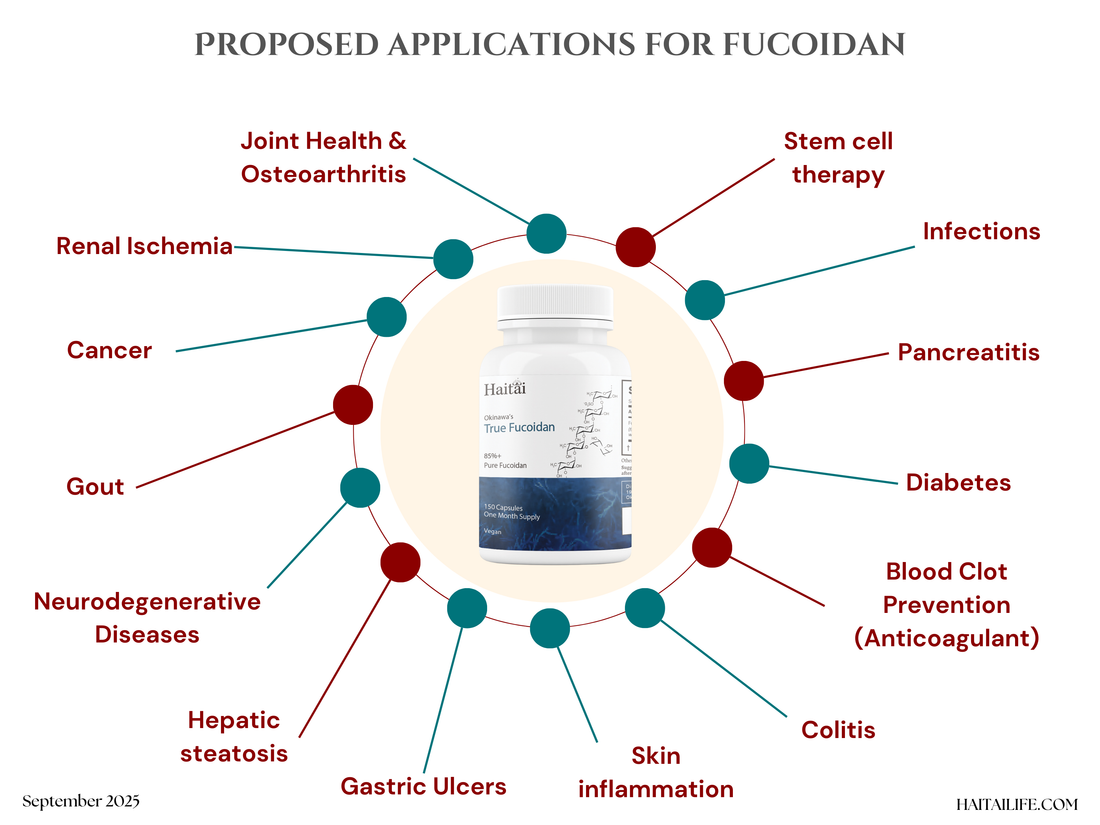What Science Says About the Health Benefits of Fucoidan
From immune support to joint health, Fucoidan - a natural compound found in certain seaweeds like mozuku - is increasingly capturing the attention of researchers and consumers worldwide. Interest in Fucoidan continues to grow each year, with more new studies popping up all the time exploring Fucoidan's effects across a wide range of health conditions.
We’ve reviewed the scientific findings to bring you a clear and concise summary of what current research suggests about the Health Benefits of Fucoidan.
The infographic below highlights 14 of the most exciting areas of developing research into Fucoidan’s potential health applications. Early findings suggest Fucoidan may play roles in inflammation reduction, immune system regulation, pain management, and protection against certain infections.

Infographic: Proposed Applications for Fucoidan - September 2025
Note: These proposed applications for Fucoidan are based on findings outlined in peer-reviewed scientific studies. Research on Fucoidan is ongoing, and while early results are promising, many of these potential benefits are not yet fully proven in humans and more research is needed. For more details, see the reference list at the end of this article.
The possible benefits of Fucoidan highlighted in the infographic above are wide-ranging and promising. However, it’s important to remember that most studies at this time remain preliminary, and further research is needed before Fucoidan can be considered a proven treatment for any condition.
To ensure transparency, we’ve included a comprehensive table of research references at the end of this article. Whether you’re exploring fucoidan supplements or staying updated on the latest scientific health research, this resource is a valuable guide for deepening your understanding.
Which Fucoidan Should I Take?
Take a look at why Haitai’s True Fucoidan stands out from the other fucoidan supplements out there. The reasons will surprise you... it surprised us when we first discovered this about fucoidan supplements!
Academic References for Your Continued Fucoidan Reading and Research.
Proposed Applications for Fucoidan - All references verified as of September 2025
| Condition Name | Academic Scientific Reference |
| Joint Health & Osteoarthritis |
|
| Renal Ischemia |
|
| Cancer |
Jin, J. O., Yadav, D., Madhwani, K., Puranik, N., Chavda, V., & Song, M. (2022). Seaweeds in the Oncology Arena: Anti-Cancer Potential of Fucoidan as a Drug-A Review. Molecules (Basel, Switzerland), 27(18), 6032. https://doi.org/10.3390/molecules27186032 Brief Summary of Main Findings: Fucoidan as potential drug review study highlights Fucoidan's anti-cancer potential through mechanisms including apoptosis induction, cell cycle arrest, anti-angiogenesis, and immune modulation, showing efficacy against various cancer types in preclinical studies without significant toxicity. |
| Gout |
Zhang, Y., Tan, X., Lin, Z., Li, F., Yang, C., Zheng, H., Li, L., Liu, H., & Shang, J. (2021). Fucoidan from Laminaria japonica Inhibits Expression of GLUT9 and URAT1 via PI3K/Akt, JNK and NF-κB Pathways in Uric Acid-Exposed HK-2 Cells. Marine drugs, 19(5), 238. https://doi.org/10.3390/md19050238 Brief Summary of Main Findings: Theoretical basis for hyperuricemia treatment (anti-gout treatment); Fucoidan inhibited uric acid-induced expression of urate transporters GLUT9 and URAT1 in renal tubular cells via the PI3K/Akt/NF-κB pathway, reducing hyperuricemia and inflammation in a mouse model. |
| Neurodegenerative Diseases | Wang, Y., Wang, Q., Han, X., Ma, Y., Zhang, Z., Zhao, L., Guan, F., & Ma, S. (2021). Fucoidan: a promising agent for brain injury and neurodegenerative disease intervention. Food & function, 12(9), 3820–3830. https://doi.org/10.1039/d0fo03153d Brief Summary of Main Findings: Fucoidan exhibits potential neuroprotective effects by reducing oxidative stress, inflammation, and apoptosis in neuronal cells, showing potential applications in models of Alzheimer's, Parkinson's, and traumatic brain injury. Potential benefits of Fucoidan in combination with other drugs in the treatment of neurodegenerative diseases and brain injury summarized. |
| Hepatic Steatosis | Shih, P.-H., Shiue, S.-J., Chen, C.-N., Cheng, S.-W., Lin, H.-Y., Wu, L.-W., & Wu, M.-S. (2021). Fucoidan and Fucoxanthin Attenuate Hepatic Steatosis and Inflammation of NAFLD through Modulation of Leptin/Adiponectin Axis. Marine Drugs, 19(3), 148. https://doi.org/10.3390/md19030148 Brief Summary of Main Findings: Fucoidan combined with fucoxanthin reduced hepatic lipid accumulation, inflammation, and gut dysbiosis in a high-fat diet-induced NAFLD mouse model. Evidence of Fucoidan as prebiotic with potential to help regulate gut microbiota in NAFLD. |
| Gastric Ulcers | Hu, Y., Ren, D., Song, Y., Wu, L., He, Y., Peng, Y., ... & Wang, Q. (2020). Gastric protective activities of fucoidan from brown alga Kjellmaniella crassifolia through the NF-κB signaling pathway. International Journal of Biological Macromolecules, 149, 893-900. Brief Summary of Main Findings: Fucoidan protected against gastric ulcers in mice by mediating inflammatory responses, reducing oxidative stress, and maintaining mucosal integrity. |
| Skin Inflammation | Fernando, I. P. S., Dias, M. K. H. M., Madusanka, D. M. D., Han, E. J., Kim, M. J., Heo, S. J., Lee, K., Cheong, S. H., & Ahn, G. (2021). Low molecular weight fucoidan fraction ameliorates inflammation and deterioration of skin barrier in fine-dust stimulated keratinocytes. International journal of biological macromolecules, 168, 620–630. https://doi.org/10.1016/j.ijbiomac.2020.11.115 Brief Summary of Main Findings: Evidence for skin hydrating effects and reduction of inflammation and oxidative stress suggesting potential for treating skin inflammatory conditions and protection against skin barrier deterioration. |
| Colitis |
Lean QY, Eri RD, Fitton JH, Patel RP, Gueven N (2015) Fucoidan Extracts Ameliorate Acute Colitis. PLoS ONE 10(6): e0128453. https://doi.org/10.1371/journal.pone.0128453 Brief Summary of Main Findings: Oral fucoidan extracts significantly reduced inflammatory pathology, colon shortening, and histological damage in a dextran sulfate sodium-induced acute colitis mouse model, indicating anti-inflammatory and protective effects on the intestinal mucosa. |
| Stem Cell Therapy | Han, Y. S., Lee, J. H., Jung, J. S., Noh, H., Baek, M. J., Ryu, J. M., Yoon, Y. M., Han, H. J., & Lee, S. H. (2015). Fucoidan protects mesenchymal stem cells against oxidative stress and enhances vascular regeneration in a murine hindlimb ischemia model. International journal of cardiology, 198, 187–195. https://doi.org/10.1016/j.ijcard.2015.06.070 Brief Summary of Main Findings: Fucoidan pretreatment protected mesenchymal stem cells from oxidative stress-induced apoptosis and enhanced their survival, proliferation, and vascular regenerative potential when transplanted into ischemic hindlimbs of mice. |
| Infections | Pradhan, B., Nayak, R., Patra, S., Bhuyan, P. P., Behera, P. K., Mandal, A. K., Behera, C., Ki, J. S., Adhikary, S. P., MubarakAli, D., & Jena, M. (2022). A state-of-the-art review on fucoidan as an antiviral agent to combat viral infections. Carbohydrate polymers, 291, 119551. https://doi.org/10.1016/j.carbpol.2022.119551 Brief Summary of Main Findings: Fucoidan demonstrates broad-spectrum antiviral activity by inhibiting viral attachment, entry, and replication through interference with host cell receptors and enzymes, showing efficacy against viruses like herpes simplex, influenza, and SARS-CoV-2. |
| Pancreatitis | Zhang, Q., et al. (2013). Protective effects of fucoidan, a P- and L-selectin inhibitor, in murine acute pancreatitis. Hepatology Research, 43(11), 1192–1203. Brief Summary of Main Findings: Fucoidan reduced the severity of acute pancreatitis in mice by inhibiting P- and L-selectin-mediated neutrophil infiltration and systemic inflammation, leading to decreased pancreatic edema and tissue damage. Fucoidan reduced pancreatitis severity by decreasing neutrophil infiltration and systemic inflammation. |
| Diabetes |
Aleissa, M. S., Alkahtani, S., Abd Eldaim, M. A., Ahmed, A. M., Bungău, S. G., Almutairi, B., Bin-Jumah, M., AlKahtane, A. A., Alyousif, M. S., & Abdel-Daim, M. M. (2020). Fucoidan Ameliorates Oxidative Stress, Inflammation, DNA Damage, and Hepatorenal Injuries in Diabetic Rats Intoxicated with Aflatoxin B1. Oxidative medicine and cellular longevity, 2020, 9316751. https://doi.org/10.1155/2020/9316751 Brief Summary of Main Findings: Fucoidan treatment in diabetic rats exposed to aflatoxin B1 significantly reduced blood glucose, oxidative stress, inflammatory cytokines, and hepatorenal damage, improving overall metabolic and organ health. |
| Blood Clot Prevention (Anticoagulant) | Soeda, S., Sakaguchi, S., Shimeno, H., & Nagamatsu, A. (1992). Fibrinolytic and anticoagulant activities of highly sulfated fucoidan. Biochemical pharmacology, 43(8), 1853–1858. https://doi.org/10.1016/0006-2952(92)90721-t Brief Summary of Main Findings: Demonstrated highly sulfated fucoidan possesses strong fibrinolytic and anticoagulant properties in rat model. Fucoidan activates plasminogen to promote clot breakdown and inhibits thrombin to prevent blood clotting, effectively reducing endotoxin-induced hepatic vein thrombosis in hyperlipemic rats without causing excessive bleeding. |
Disclaimer: Always consult a healthcare professional before starting any supplements. Individual results may vary.



